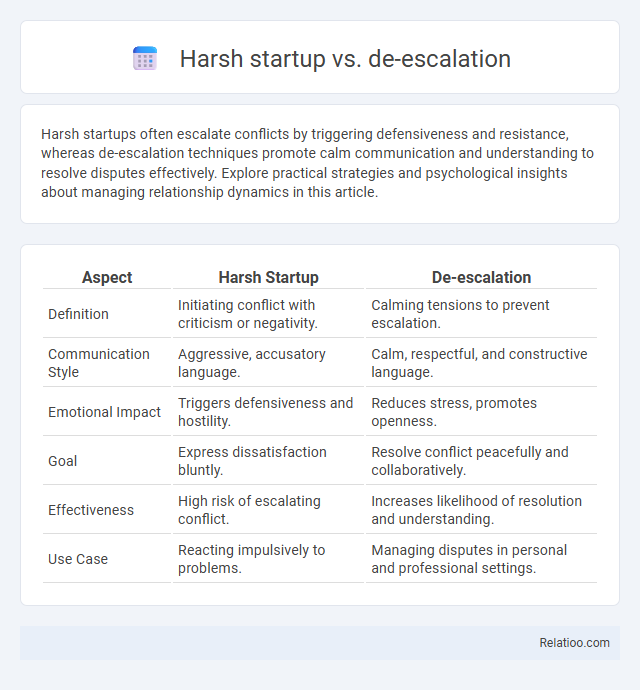Harsh startups often escalate conflicts by triggering defensiveness and resistance, whereas de-escalation techniques promote calm communication and understanding to resolve disputes effectively. Explore practical strategies and psychological insights about managing relationship dynamics in this article.
Table of Comparison
| Aspect | Harsh Startup | De-escalation |
|---|---|---|
| Definition | Initiating conflict with criticism or negativity. | Calming tensions to prevent escalation. |
| Communication Style | Aggressive, accusatory language. | Calm, respectful, and constructive language. |
| Emotional Impact | Triggers defensiveness and hostility. | Reduces stress, promotes openness. |
| Goal | Express dissatisfaction bluntly. | Resolve conflict peacefully and collaboratively. |
| Effectiveness | High risk of escalating conflict. | Increases likelihood of resolution and understanding. |
| Use Case | Reacting impulsively to problems. | Managing disputes in personal and professional settings. |
Understanding Harsh Startups in Conflict
Harsh startups in conflict scenarios refer to abrupt, aggressive initiations of confrontations that escalate tensions rapidly, often leading to prolonged disputes and loss of mutual trust. De-escalation techniques focus on reducing hostility through calm communication, empathy, and strategic pauses to prevent conflicts from intensifying or recurring. Comparing harsh startups to de-escalation highlights the importance of managing initial conflict triggers effectively to foster resolution and maintain constructive relationships.
Defining De-escalation in Communication
De-escalation in communication involves techniques designed to reduce tension and conflict, fostering a calmer and more constructive interaction. Unlike harsh startup, which involves beginning a conversation with criticism or negativity that often leads to defensiveness, de-escalation emphasizes empathy, active listening, and neutral language to prevent misunderstandings. By mastering de-escalation, you can transform potentially volatile discussions into opportunities for collaboration and resolution.
Psychological Triggers Behind Harsh Startups
Harsh startups trigger heightened stress responses by activating your brain's threat detection system, causing anxiety and resistance due to abrupt environmental changes or intense stimuli. Psychological triggers such as fear of loss, uncertainty, and unexpected challenges intensify this reaction, often leading to defensive behaviors or cognitive overload. Understanding these triggers helps manage harsh startups more effectively, promoting smoother transitions and reducing negative emotional impacts.
Benefits of De-escalation Strategies
De-escalation strategies provide essential benefits such as reducing conflict intensity and fostering peaceful resolutions, which create safer environments for all participants. These approaches help you maintain control over volatile situations by promoting calm communication and minimizing the risk of injury or escalation. Implementing effective de-escalation techniques enhances conflict management skills, improving overall outcomes in both personal and professional settings.
Comparing Outcomes: Harsh Startup vs De-escalation
Harsh startup in conversations often triggers defensive responses and escalates conflicts, leading to poorer relationship outcomes and increased emotional distress. De-escalation techniques, by contrast, promote calm and constructive dialogue, improving communication effectiveness and fostering emotional safety. Understanding how your approach influences results can transform interactions, with de-escalation consistently yielding more positive and lasting resolutions than harsh startups.
How Harsh Startups Escalate Tension
Harsh startups escalate tension by causing abrupt engine stress and sudden torque surges, which can lead to increased wear on drivetrain components and reduced vehicle stability. Your vehicle experiences rapid acceleration forces that heighten mechanical strain and create a more aggressive driving environment, potentially escalating conflicts on the road. This approach contrasts with de-escalation techniques that promote smoother startups, minimizing stress on the engine and reducing overall tension during vehicle operation.
Key Techniques for Effective De-escalation
Harsh startup, which involves beginning conversations with criticism or blame, often triggers defensiveness and escalates conflicts, whereas effective de-escalation relies on techniques such as using calm, non-threatening language, active listening, and expressing empathy to reduce tension. Employing "I" statements instead of "You" accusations helps prevent misunderstandings and promotes constructive dialogue. Your ability to remain composed and validate the other person's feelings is key to transforming a potentially hostile interaction into a collaborative resolution.
Long-term Relationship Impact: Startup Styles
Harsh startup techniques often trigger defensive responses, leading to increased conflict and erosion of trust in long-term relationships. De-escalation approaches promote calm dialogue and mutual understanding, fostering stronger emotional bonds and resilience over time. Your relationship health is significantly influenced by choosing communication styles that prioritize empathy and conflict resolution.
Practical Examples: Real-life Scenarios
Harsh startup refers to abruptly powering on machinery or engines, often causing mechanical strain and decreased lifespan, while de-escalation involves gradual activation to minimize wear and tear. A practical example includes automotive engines: starting a car harshly by revving the engine immediately contrasts with a de-escalated startup where the driver allows the engine to idle briefly before accelerating, preserving engine health. You can extend these principles to industrial equipment, where harsh startups may cause costly downtime, whereas controlled startups boost operational efficiency and equipment longevity.
Building Healthy Communication Patterns
Harsh startup, characterized by critical or aggressive opening statements, undermines healthy communication patterns by triggering defensiveness and escalating conflict. De-escalation techniques, such as using neutral language and active listening, help shift conversations toward constructive dialogue and emotional regulation. Prioritizing gentle startups fosters trust, promotes understanding, and strengthens relationship resilience through positive communication dynamics.

Infographic: Harsh startup vs De-escalation
 relatioo.com
relatioo.com